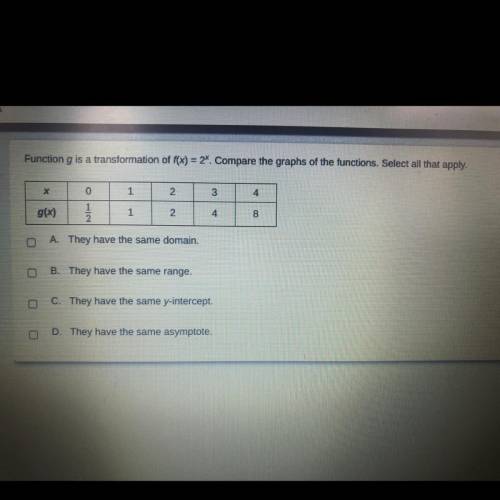
Mathematics, 18.05.2021 23:50 jake56555
Function g is a transformation of f(x) = 2 Compare the graphs of the functions. Select all that apply.
Х
1
2
3
4
g(x)
11 /
1
2.
4
8
A. They have the same domain.
B. They have the same range.
C. They have the same y-intercept.
圖
D. They have the same asymptote.


Answers: 1


Other questions on the subject: Mathematics

Mathematics, 21.06.2019 16:00, SavyBreyer
Use the function f(x) is graphed below. the graph of the function to find, f(6). -2 -1 1 2
Answers: 1


Mathematics, 21.06.2019 21:00, walkinginmypurpose
Use the following random list of 100 numbers and the same assignations as in the example (0-4 represent girls and 5-9 represent boys) to answer the questions below. 3199 9288 1023 1130 0809 1770 6231 7538 8927 4761 7258 7111 0209 0916 1450 9848 4654 7579 6150 3093 9608 0061 4014 9501 0382 3052 2385 9074 1664 6551 6577 1811 3454 5870 1277 5056 1063 5697 9141 4120 9181 1343 0168 3693 0463 4842 1704 3774 4908 4161 6404 9675 2518 3988 4268 6083 0636 9634 5295 5656 1918 3133 6831 8393 6363 2452 1531 1638 1317 2279 9395 0702 2091 5269 0422 0275 3373 1424 1958 0356 5163 0743 6658 6257 2772 0570 4522 2665 0890 3560 5549 2238 2172 9715 9741 4975 6617 9034 4441 8220 based on the results of the second simulation, what is the experimental probability that a group will include only boys? based on the results of the second simulation, what is the experimental probability that a group will not contain four boys?
Answers: 2

Mathematics, 22.06.2019 02:00, darianhaynes
Study published in the journal of personality and individual differences found that adults with adhd displayed more creative achievement than those who didn't have the disorder. "for the same reason that adhd might create problems, like distraction, it can also allow an openness to new ideas," says holly white, assistant professor of cognitive psychology. "not being completely focused on a task lets the mind make associations that might not have happened otherwise." white and priti shah at the university of michigan gave 60 college students – half of them with adhd – a series of tests measuring creativity across 10 domains. the adhd group scored higher across the board. the adhd group showed more of a preference for brainstorming and generating ideas than the non-adhd group, which preferred refining and clarifying ideas. the adhd status of the participants was established by asking whether the individual had ever been clinically diagnosed with adhd/add. the tests of creativity were pencil-and-paper tasks administered in a laboratory setting. each of the ten scales was comprised of multiple questions, the scores on which were summed (e. g., writing creativity: "how many words can you make from the letters in the word 'psychology' invention creativity: "write down as many uses for a paper clip that you can think of.") this procedure does allow for a participant to be scored as showing no creativity under these conditions. a) state the research question in plain language (i wonder if is related to (1 point) b) state the null hypothesis (1 point) c) state the research hypothesis (1 point) d) is the research hypothesis directional or non-directional (1 point) e) name the predictor / independent variable f) give the operational definition of the predictor / independent variable g) evaluate the construct validity of the predictor / independent variable. (face, procedure, method-match) h) name the outcome / dependent variable i) give the operational definition of the outcome / dependent variable. j) evaluate the construct validity of the outcome / dependent variable. (face, procedure, method-match)
Answers: 1
You know the right answer?
Function g is a transformation of f(x) = 2 Compare the graphs of the functions. Select all that appl...
Questions in other subjects:




Mathematics, 22.09.2019 21:00


Social Studies, 22.09.2019 21:00

History, 22.09.2019 21:00

History, 22.09.2019 21:00

Social Studies, 22.09.2019 21:00




